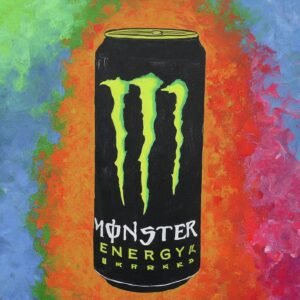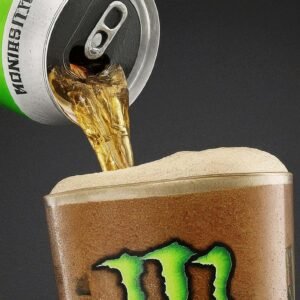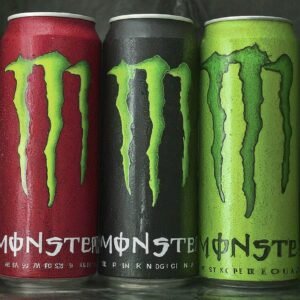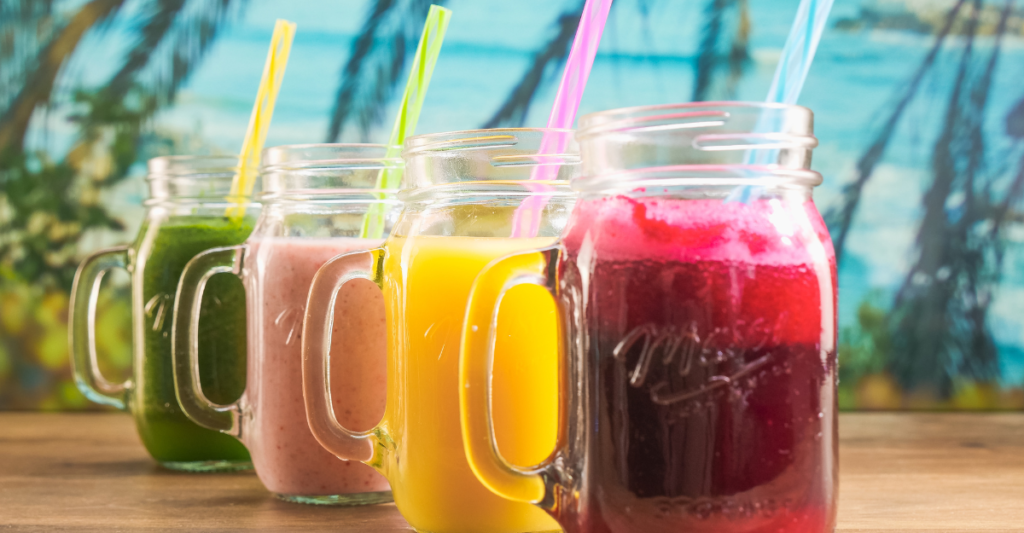As energy drinks continue to gain popularity, many people wonder about their health implications. One of the most well-known brands, Monster Energy, often comes under scrutiny.
So, is Monster Energy drink bad for you? In this blog post, I’ll provide an evidence-based perspective to help you make an informed decision.
Is monster energy drink bad for you?

Yes, Monster energy drinks can be bad for you, especially due to their high caffeine content. The Energy Drink Expenditure for Adolescents and Teens study has linked regular consumption to increased health risks like anxiety, insomnia, and hyperactivity. It’s wise to limit their intake for better health.
5 Reasons Why Monster Energy Drink Is Bad for You

As someone who values health and well-being, I’ve taken a closer look at popular energy drinks like Monster. While these beverages promise a quick energy boost, there are multiple reasons why they might not be the best choice for your health.
Let’s dive into the five main reasons why Monster Energy Drink could be bad for you. Also explore the benefits of Monster Energy Drink.
1. High Sugar Content
One of the key concerns with Monster Energy Drink is its high sugar content. One 16-ounce can has about 54 grams of sugar, exceeding the daily sugar limit for both men and women.
Excessive sugar consumption can lead to weight gain, type 2 diabetes, and other metabolic disorders.
2. Excessive Caffeine Levels
Monster Energy Drinks are loaded with caffeine, with one can containing around 160 milligrams. While caffeine can temporarily boost alertness, consuming it in large amounts can lead to increased heart rate, high blood pressure, and even heart palpitations.
It’s important to remember that caffeine tolerance varies from person to person, making it potentially dangerous for some individuals.
3. Artificial Additives
These energy drinks are also packed with artificial additives and preservatives. Ingredients like high fructose corn syrup, artificial colors, and flavors can have long-term adverse effects on your health.
Studies have shown that these additives can contribute to various health issues, including allergies and hyperactivity in children.
4. Poor Sleep Quality
Due to its high caffeine content, consuming Monster Energy Drink can interfere with your sleep patterns. Caffeine has a half-life of about 5 to 6 hours, meaning it can stay in your system for a long time.
This can make it difficult to fall asleep or stay asleep, leading to poor sleep quality and various health issues related to sleep deprivation.
5. Potential for Addiction
The combination of high sugar and caffeine levels in Monster Energy Drinks can make them quite addictive.
Regular consumption can lead to dependence, causing you to crave more to achieve the same energy boost. This cycle can be hard to break and may lead to long-term health consequences.
Are sugar-free monster energy drinks bad for you?
Too much sugar-free Monster Energy can also be harmful to your health. While they lack sugar, they often contain artificial sweeteners like sucralose or aspartame.
These sweeteners, in large amounts, can lead to health issues like headaches, digestive problems, and even metabolic disturbances.
According to the European Food Safety Authority (EFSA), the Acceptable Daily Intake (ADI) for aspartame is 40 mg per kg of body weight.
Exceeding this limit regularly can have adverse effects. Moreover, energy drinks, even sugar-free ones, are high in caffeine, which can cause insomnia, anxiety, and heart palpitations if consumed excessively.
The American Heart Association recommends a daily caffeine intake of no more than 400 milligrams, roughly equivalent to four cups of brewed coffee.
Therefore, while sugar-free Monster Energy drinks can be a convenient pick-me-up, moderation is key to avoiding potential health risks. Also explore that Do Monster Energy Drinks Expire?
Can you die from drinking Monster everyday?
Drinking Monster energy drinks daily can be harmful due to their high caffeine and sugar content. Excessive caffeine intake can lead to increased heart rate, high blood pressure, insomnia, and anxiety.
A standard 16-ounce can of Monster contains about 160 milligrams of caffeine, exceeding the daily recommended limit for adults. Continuous consumption can also cause dependency and withdrawal symptoms when trying to cut back.
According to the European Food Safety Authority (EFSA), consuming more than 400 milligrams of caffeine per day may lead to adverse health effects.
For instance, severe caffeine overdose can result in palpitations, nausea, and even cardiac arrest in extreme cases.
It’s crucial to moderate energy drink consumption and consider healthier alternatives like water or unsweetened beverages. Consulting a healthcare professional for personalized advice is always advisable.
Is Monster Energy Drink Bad for Kids?

As a parent, you may be concerned about your child consuming energy drinks like Monster. These beverages are marketed to boost energy levels and improve concentration. However, it’s essential to understand the effects of these drinks, especially on younger individuals.
High Caffeine Content
The big worry about Monster Energy drinks is how much caffeine they have. A standard 16-ounce can of Monster contains about 160 milligrams of caffeine. Just to compare, a regular cup of coffee has about 95 milligrams of caffeine.
According to the American Academy of Pediatrics, children and adolescents should avoid caffeine due to its potential side effects, including increased heart rate, high blood pressure, and sleep disturbances.
Impact on Health
Consuming high amounts of caffeine can have several adverse effects on kids. Research indicates that excessive caffeine intake can lead to anxiety, digestive issues, and dehydration.
Additionally, energy drinks like Monster often contain large amounts of sugar, which can contribute to obesity, dental problems, and type 2 diabetes.
The Centers for Disease Control and Prevention (CDC) warns that energy drinks can pose serious health risks to children and adolescents.
Recommendations and Alternatives
Given the potential health risks, it is advisable to discourage children from consuming energy drinks like Monster. Instead, encourage healthier alternatives such as water, milk, and natural fruit juices.
Ensuring that children get adequate sleep, balanced nutrition, and regular physical activity can naturally boost their energy levels and concentration.
Long-Term Side Effects of Monster Energy Drinks
Monster Energy Drinks have gained immense popularity over the years, especially among young adults and athletes looking for a quick energy boost. However, it’s crucial to understand the potential long-term side effects of these beverages.
With a combination of high caffeine levels, sugar, and other additives, these drinks can affect your health in more ways than one. Here’s what you need to know. Also explore the 25 side effects of Monster Energy Drinks.
1. Impact on Heart Health
One of the most concerning long-term side effects of Monster Energy Drinks is their impact on heart health. Studies have shown that consuming high levels of caffeine can lead to increased heart rate, high blood pressure, and even heart palpitations.
According to the American Heart Association, excessive caffeine intake can elevate the risk of cardiovascular diseases.
For instance, a study published in the Journal of the American Heart Association found that energy drinks could alter the heart’s electrical activity and increase blood pressure.
2. Risk of Type 2 Diabetes
Another significant concern is the high sugar content in Monster Energy Drinks. Regular consumption can lead to an increased risk of developing Type 2 diabetes.
The World Health Organization recommends limiting sugar intake to less than 10% of total daily calories to reduce the risk of chronic diseases.
Monster Energy Drinks often contain up to 54 grams of sugar per can, which is significantly higher than the recommended daily limit. Over time, this excessive sugar intake can lead to insulin resistance and eventually Type 2 diabetes.
3. Mental Health Concerns
Long-term consumption of Monster Energy Drinks can also have adverse effects on mental health. High caffeine levels can lead to increased anxiety, stress, and even depression.
A study published in the journal ‘Depression and Anxiety’ found that high caffeine consumption is associated with higher levels of anxiety and depressive symptoms.
Additionally, the crash that follows the energy boost can lead to mood swings and irritability, further affecting mental well-being.
Conclusion
To sum it up, Monster Energy drinks can be part of your lifestyle if consumed in moderation. However, being aware of their ingredients and potential health risks is essential.
Always consult healthcare professionals if you have specific health concerns related to energy drink consumption. Stay informed and make choices that support your overall well-being.

